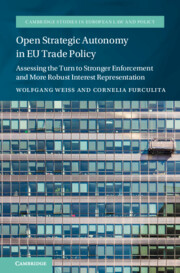 Open Strategic Autonomy in EU Trade Policy
Open Strategic Autonomy in EU Trade Policy Addressing Dispute Settlement Blockages
from Part II - The Tools for Stronger Enforcement of Trade Rights
Published online by Cambridge University Press: 29 November 2024
Chapter 5 is dedicated to the analysis of the amended EU Trade Enforcement Regulation 654/2014 to allow the imposition of unilateral countermeasures in case of appeals into the void in the WTO context or of an FTA party blocking panel proceedings. The chapter introduces the original Regulation, recent amendments, and their legislative history. It then appraises the legality of the amendments in light of WTO and FTA rules and whether general public international law on state responsibility could serve as the necessary legal basis for unilateral countermeasures. Assuming that the imposition of unilateral countermeasures under the amended Trade Enforcement Regulation would be in line with EU’s obligations, Chapter 5 also considers their compliance with the conditions established by general public international law. Finally, the amendments’ possible influence on and consequences for the multilateral trading system are explored in light of EU’s commitment to multilateralism and international law.
To save this book to your Kindle, first ensure [email protected] is added to your Approved Personal Document E-mail List under your Personal Document Settings on the Manage Your Content and Devices page of your Amazon account. Then enter the ‘name’ part of your Kindle email address below. Find out more about saving to your Kindle.
Note you can select to save to either the @free.kindle.com or @kindle.com variations. ‘@free.kindle.com’ emails are free but can only be saved to your device when it is connected to wi-fi. ‘@kindle.com’ emails can be delivered even when you are not connected to wi-fi, but note that service fees apply.
Find out more about the Kindle Personal Document Service.
To save content items to your account, please confirm that you agree to abide by our usage policies. If this is the first time you use this feature, you will be asked to authorise Cambridge Core to connect with your account. Find out more about saving content to Dropbox.
To save content items to your account, please confirm that you agree to abide by our usage policies. If this is the first time you use this feature, you will be asked to authorise Cambridge Core to connect with your account. Find out more about saving content to Google Drive.